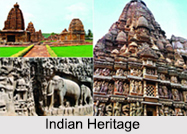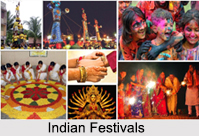Indian Culture and traditions are something which has now become renowned all across the world. Indian Culture is very diverse and unique and has been interpreted in various ways. There are varied ideas that pass through one's mind when Indian Culture is the subject to be spoken on. To some philosophical and spiritual beliefs are the bases of Indian Culture. Others say that dreams and ideals as embodied in the best architecture, the sculpture and paintings reflect Indian Culture. Some, on the other hand, point out the various symbolic representations of thought-forms like the concept of Nataraja or the Indian Music with its varied Ragas as the essence of Indian Culture. The South, East, West, North, Central and North-East have their own distinct cultures and almost every state has carved out its own cultural niche. There is hardly any culture in the world that is as varied and unique as India. India is a vast country, having variety of geographical features and climatic conditions. India is home to some of the most ancient civilizations, including four major world religions; Hinduism, Buddhism, Jainism and Sikhism.
 History of Indian Culture
History of Indian CultureThe origin of Indian culture is the Vedic age which includes ancient treatises like,Upanishads, Ramayana and Mahabharata. The history of Indian Culture is deep rooted in the Indus Valley Civilization and the arrival of the Aryans. Both these phases are described as the pre-Vedic and Post Vedic periods respectively. It was during the Vedic period that Hinduism evolved. Then ushered in the Classical Age that began with Buddhism and ended with Harsha Vardhan. After this, the medieval age begins with the Rajput culture and ending with the Indo-Muslim culture. Thereafter comes the modern age. This age witnesses the Western influences on the Indian Culture and the beginning of the Indian Renaissance.
 Features of Indian Culture
Features of Indian CultureTolerance is one of the major features of Indian culture. All races have found their habitation in India but they have not been persecuted. Balance is also a marked characteristic of Indian Culture. It is also characterised by harmony. Ceaseless search after truth is another feature of Indian culture. Fundamentally, India has always possessed great unity and continuity of culture. India has found unity in religion and spirituality. All her art forms expressed the same truth. The Hindu custom of religious pilgrimages betokened the same consciousness of a common homeland. Fundamental unity of India was rooted in the psychology of the Indians. Politically also, the attempts at empire-building embracing the whole of India indicate the trend towards unity. Culturally there is a complex harmony of composites. Certain common ideas are practiced by the Indians from times immemorial.
